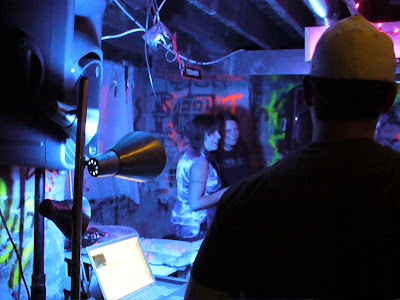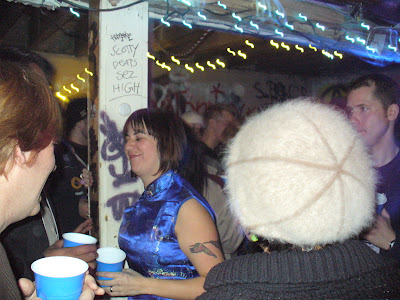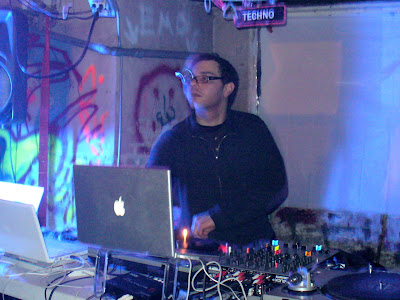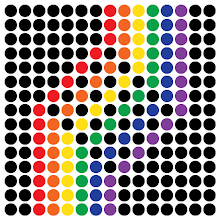The Day After: Aches and Gains
So, after last night's insanity, I limped home around 7:30am (thankfully I found a decent parking spot!) and put myself to sleep. By 1pm, I was back up and getting ready for my professorly duties. I spent an hour or two reading the articles and essays for this week, then threw on some clothes and headed down to campus. My friend and course assistant, bless her soul, showed up and helped me run the screening, which I really appreciated. I was awake and able to speak in complete sentences, but I was just barely holding myself together through the magic of coffee.
Anyway, there were a few thoughts that I had last night that have managed to survive the neurochemical blitzkrieg I waged upon myself. Most of them point toward potential ideas for my doctoral project, so I'm sorry if a lot of this seems obtuse or disorganized...
The Body Undone
As I was really getting into dancing last night, I began to feel like my body was all surface--all flat and curved planes that intersected sort of like those abstract polygonal models you sometimes see in 3D rendering demos. My insides didn't so much disappear as become part of these same surfaces, continuous extensions of my skin. Another way of putting it is that the feeling of my body as a body, a whole object saturated with "me," began to feel like a jumble of bits and pieces--like bundles of flesh that I can swing about.
At the same time, though, my body felt intensely granular. I would be doing my usual house-informed "liquid" style dancing, rolling and undulating my body like it was a rubber band, and I would twist and lift my foot and I would feel everything. Again, I didn't feel my body as continuous and uniform, but rather as a collection of small components joined together: knuckles, toenails, muscules, joints, blood, skin and so on.
Deleuze & Guattari, in their two-part tome, Capitalism and Schizophrenia, make a distinction between the molecular and the molar, insisting that the body and life more broadly should to be understood first as a collection of innumerable tiny machines and only later as a solid form. Between the feeling of the body as smooth surfaces and packed particles, I think what I was feeling here was a sort of undoing of my molar body into something more molecular. Instead of a dense and opaque thing called a "body," I felt my dancing world as both smooth, transparent surface and pebbled, translucent granularity. It was as if my body (my self?) stopped being coherent. I was both a jar of glass and a cluster of marbles; but no longer was I a solid mass.
The Wet and the Dry
Throughout that night, I kept on thinking of how the space of the party was both wet and dry. I was imagining the "magic" of a solid and intimate social scene as somehow wet: smooth and slick, with only whorls and ripples rather than scratching and grinding, warm and continuous. Much in the way that drops are absorbed into a glossy puddle, I imagine this ideal crowd as a shimmering pool of continuous bodies—or maybe a roiling river of flesh and feelings. At the most literal-minded extreme, a "wet" social space would resemble a Crisco-lubed game of Twister-turned-orgy.
And yet I was surprised again and again, all night, at how dry the crowd was: for all of our dense dancing-together, there was still empty space between bodies, the occasional cracking and breaking of the social skin as people sometimes failed to get along effortlessly, the fine and irregular grain of the room and the non-identical bodies in it. This was not a smooth crowd.
But it was certainly hot and steamy, no? I know that I'm literalizing my own metaphor here. Up until now, "wet" and "dry" were metaphorical terms for different textures of social togetherness. And yet the humidity that built up in the room filled these spaces and put our bodies on a path of becoming-solid (I remember a child of a friend of mine complaining--in the height of a Chicago summer heat wave--that the humidity was "like breathing pudding"). There is something about effort, burning energy in this dense milieu, that makes this jumble of hard and incongruous objects feel like it's turning into something continuous, supple and yet solid.
The revelation for me during this party was that this, here, is the place and the context and the event of solidarity--populated not by the idealized or generalized category of "party people" to which we ambivalently subscribe and not filled with stylistically pure and emblematic "techno" (or whatever), but by these bodies currently in the room, the music playing now, the space that is available to fill. Something happens to connect the grainy particularity of me and you and this girl and that guy to a vague, unfocused but ontologically dense event of generalized togetherness. This relation between the feeling of possible solidarity through the generalization of the self and the event of its immanent emergence/becoming in the dancing crowd is not an imaginary one, but I'm not sure what kind of relation it is otherwise. Any ideas?
The Magical Real
More and more, I think that there is something about this "feeling together" that has connections to Magical Realism and the re-enchantment of the everyday in the "night out on the town." I haven't properly thought this out yet, but I think that the experience of a "good vibe" or an otherwise successful party / rave / soirée isn't some dialectic of the magically singular and the boringly common (e.g., "buying the drinks is boring, but dancing is magic!"), but is instead the magical and the mundane at the same time: a simultaneity of at least two temporalities. Maybe it's the re-enchantment of the everyday, but I'm not entirely convinced of that quite yet.
Virtuality and Danger
Something that I have retained from my reading of Brian Massumi's Deleuzian (and, in turn, Bergsonian) notion of virtuality, is that the accumulation and intensification of possibilities is at it's most valuable when it is also at it's most dangerous (Parables for the Virtual, 2004). A lot of crowd theory, for example, pays close attention to how, historically, crowds that are "on the brink" of something are just as likely to tip into chaos and violence as into positive action, synchronization or even "fun."
I was thinking of this last night as, at several points during the night, people reached up above their heads and started banging on the metallic heating ducts running across the low ceiling of the basement where the party was taking place. The ducts shook, and while tonight's hosts seemed to be pretty unconcerned, I could imagine other hosts freaking out at the potential damage to the house's infrastructure. Thankfully, nothing happened--but what if someone got carried away?
Notably, all of these moments occurred during a buildup or climax in the intensity of a DJ's set. Some would start pounding as they perceived the various sonic indicators of a coming climax (increase in volume, sudden absence of the bass, sounds that rise in pitch, continuous noises that resemble drum rolls, etc.), as if helping to "prime the pump" and prepare a scene for the moment of fullness and flow. Others would start to bang at or after the moment of "arrival," the return of the bass beat and the re-organization of musical elements, as if trying to sustain this emerging plateau of intensity and vibration. But this work of preparation, entrainment and maintenance took aproached something disruptive as well.
Well, that's all I have to say for now. I think I've exhausted myself, anyway.


















